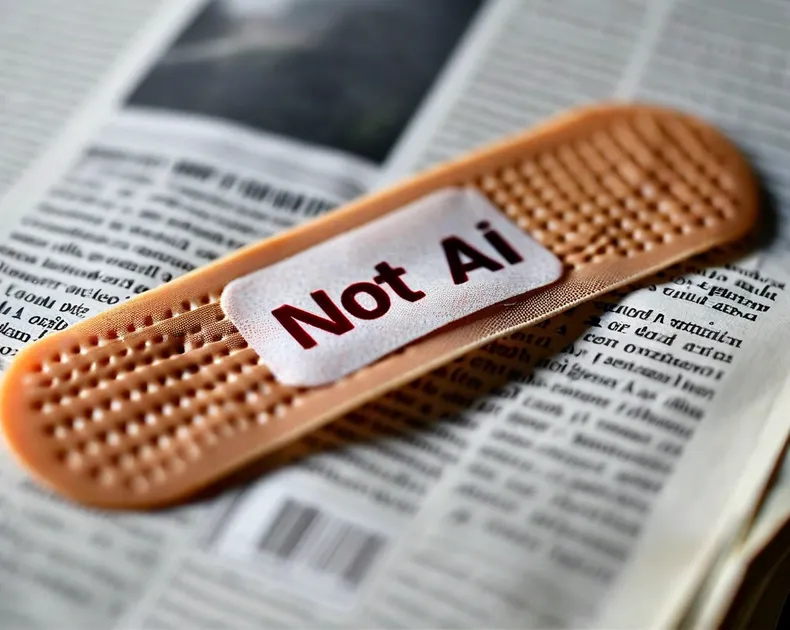Ready to get started?
No matter where you are on your CMS journey, we're here to help. Want more info or to see Glide Publishing Platform in action? We got you.
Book a demoPlans for labelling of AI-created content are gathering pace in Europe. Aside from how and where, no-one really needs to ask why.
What's in a label? Quite a lot if it says "made from mechanically reclaimed meat". In that spirit, the EU Commission has just commenced work to produce a code of practice on the use of GenAI that will "be a voluntary instrument to help providers of generative AI systems effectively meet their transparency obligations". As things stand currently, it's hard to see how that isn't a sensible thing. If you are what you eat, you may also think what you see or read.
From the consumer perspective, this move will be noticeable once agreement has been reached on how to label AI content. The European Commission gives us an idea of its direction of approach by saying "the requirement reflects the growing difficulty in distinguishing AI-generated content from authentic, human-produced material".
You won't find OpenAI et al using the word "authentic" much - far too close to "author".
Reflexively, this column is against a great deal of regulation. Loosen the asphyxiating grip of Big Tech and let the content dogs run free where they will, is our North Star. The internet is the work of humans, and humans should be trusted to develop its uses.
Unfortunately though, we're at a point where the broad perception is that the platforms are the internet, and the more people believe it, the truer it becomes. It's a constraining idea, and one that will shatter again in time.
However, we are where we are now. A new study from the University of Maryland, that looked at US news publications, found that "of 186,000 articles studied in the summer of 2025, 9.1% were either AI-generated (5.2%) or mixed (3.9%)".
Going from zero GenAI content to nearly 10% in such a short time span is quite some adoption curve, although not as earth-shattering as some tech shills would have us believe.
Tellingly, in the study the proportion of GenAI content was higher in publications with a smaller audiences than in larger players' content. I'd think this is a matter of business realities, that those with deeper pockets and stronger editorial voices in the C-Suite are simply less likely to harness GenAI to produce content. In our deeply uneven publishing market, such utilisation might be far from ideal, but remains understandable.
More delightfully to those of us who maintain some limited pride in our ability to communicate with the written word, the Maryland study revealed that where GenAI was found among, shall we say premium publications, it was mostly found in the writing of public figures who had written for them. Or not written for them, as it turns out.
That in itself is revealing, suggesting that many prominent enough to appear in such publications on their own terms are actually poor communicators who don't understand their own ideas and have to resort to GenAI.
Or maybe they just can't write. Scathing I know, but what other conclusions are there? Maybe they didn't have time. In which case, they shouldn't have accepted the commission.
Coming back to what the European Commission aims to introduce in the second half of 2026, a voluntary code, adherence to which will surely mitigate against any GenAI-related legal troubles in the EU by having such content clearly labelled, it brings up a certain paradox.
Normally, if someone makes something fabulous that the world also regards as fabulous, then the creator will want people to know who made it. That's just good marketing.
In the case of GenAI, the ultimate unique proposition is that something is being made without the involvement of humans, but crucially, it's as good as a human can create and indistinguishable from it. The value is in this lack of difference. ChatGPT's awful attempt at fiction, or metafiction, illustrates this. If it was as good as is promised, we would not know that it was GenAI. This is not the case, and although we all fear humanity falling for some machine-produced mass deception, the fact is we're a long long way from it.
I'm certainly not against the idea of labelling content as GenAI, at the very least as a precautionary measure. The technology and its uses are still reasonably fluid, and will settle in places we may not expect. It's not that mechanically reclaimed meat explicitly is bad for you, but you should know when you're eating it.
No matter where you are on your CMS journey, we're here to help. Want more info or to see Glide Publishing Platform in action? We got you.
Book a demo